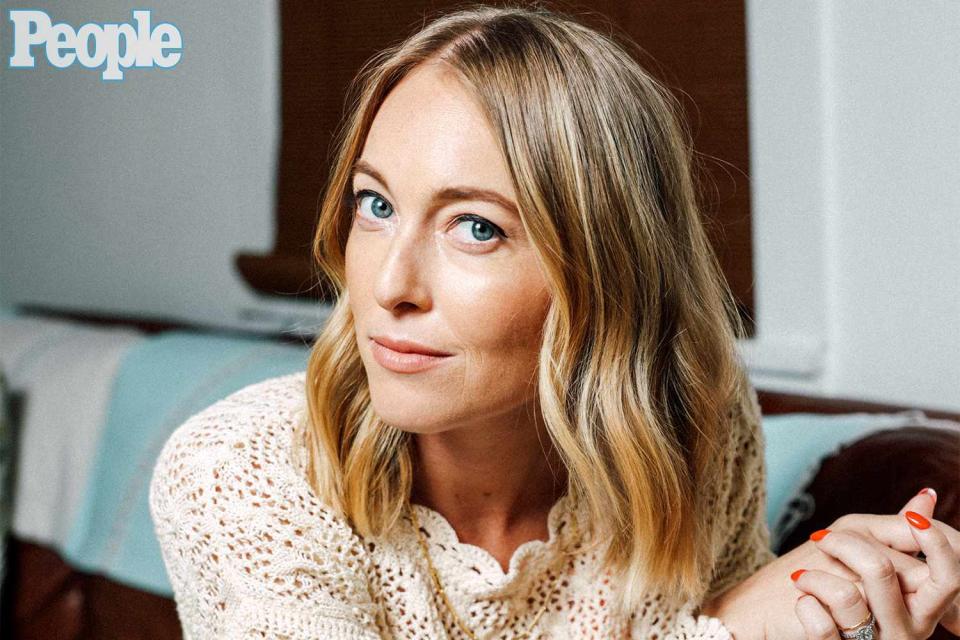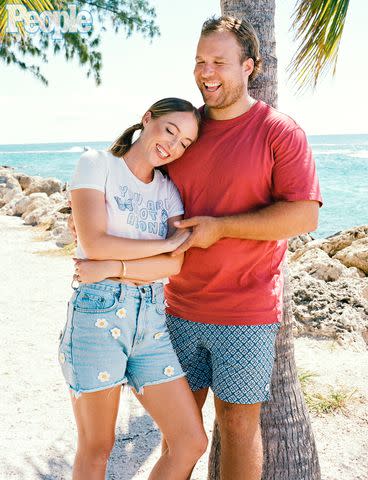India Oxenberg on Enjoying Food — and Sex — Again After Escaping the Abusive NXIVM Cult (Exclusive)
Psychedelics and cannabis have helped her relax and "retrain her brain," she says: "Sex after sexual trauma is scary"

Ysa Perez
India Oxenberg photographed for People, September 2023.After seven years in the NXIVM cult, India Oxenberg had a hard time sleeping in her own bed.
“Bed wasn't a good place for me for many years,” Oxenberg, 32, tells PEOPLE in this week’s issue. “I would sleep on the couch because I felt more comfortable there.”
Oxenberg first got involved with NXIVM at the age of 19, when she began taking what were purported to be personal development classes. But over the years, she was drawn in more deeply to the secretive group and subjected to sexual and psychological abuse at the hands of cult founder Keith Raniere and cult leader Allison Mack, both of whom were later prosecuted for their crimes.
Even after she left the cult in 2018 with the help of her mother, actress Catherine Oxenberg, the years of abuse left a lasting, painful mark, making even day-to-day activities — eating, sleeping, even being intimate with her husband, chef and restaurateur Patrick D’Ignazio, 32, whom she married in 2020 — a source of stress.

Ysa Perez
India Oxenberg and husband Patrick D'Ignazio. Photographed for People, September 2023.“The simple pleasures of life get robbed from you because of trauma,” says Oxenberg, who shares her experiences and talks with other survivors of trauma and trauma experts in her new podcast, Still Learning, which she records at home in Key West, Fla., with her producing partner, Madigan Haggerty. “Most of my headspace had been spent on how much I hated myself and how much I hated everything about me.”
Over the past five years since she left NXIVM, Oxenberg has been doing the work of healing and rebuilding her life, with the support of people like her mom and her husband.
“It took a lot of loving feedback from people that I trust,” Oxenberg says. “My mom would check in with me, ‘Are you all right?’ Because she would notice that I would look really thin at certain points. And I'd be like, ‘No, I'm not. I don't have my hunger back. I don't have the desire to eat.’”
In NXIVM, she was forced to report her weight and her food intake regularly to Mack — and there was constant shame if she didn’t measure up to Raniere’s ideal. “There was a huge emphasis on weight, because Keith’s preference was to have people be very thin, anorexic,” she says. “I struggled with an eating disorder. I struggled with body dysmorphia. I struggled with really big mental upswings and downs and all sorts of crazy symptoms.”
Related: What I Wish I Knew About Grooming: India Oxenberg Reflects on Her Experience in Nxivm
With therapy and her family support, she took small steps toward recovery. “Part of recovery is doing it anyways, feeding yourself because your body needs food,” she says. “What I've had to learn is when I fall off the track or I'm not doing things perfectly, I have ways to get myself back on track.”
Having a husband who is a chef has helped too. “I love it when he cooks for me,” she says. “Being with him and getting to explore food with somebody who really has no food issues is great. And he's helped me learn to love food again. And I am a foodie. I was naturally. I just needed to get it back.”
Cannabis, she says, has also been a useful tool. “I had cult-induced anorexia, and I still don't have my hunger cues entirely back — that's something that takes time,” she says. “But cannabis can increase my appetite. It’s been incredibly helpful for me.”
Oxenberg says that the drug has also helped her with sleeping issues— and with being able to enjoy sex again. “Sex after sexual trauma is very scary,” she says. “Even with somebody that you trust and you love, I’d still get triggered. It shoots your body into a different state that is too reminiscent of the abuse. Cannabis has helped me relax.”
When she met D’Ignzaio soon after leaving NXIVM in 2018, their connection was “instinctual,” she says. “My body felt comfortable around him.” Over time, she says, “he's helped me grow and defrost parts of my heart that felt frozen.”
But despite that, the trauma she’d experienced kept her from fully enjoying their relationship. “As soon as I would get remotely close or intimate, I would just start to freeze. I was like, ‘This sucks.’ You're like, "Wow. I really want to be close with this person, but I'm so scared,’” she says. “With sexual trauma, your body and mind feel disconnected. You might know you’re safe, but your body still responds as if it’s reliving the old trauma.”

Ysa Perez
India Oxenberg photographed for People in Key West, Fla, September 2023.Experimenting with psychedelics like magic mushrooms offered a breakthrough. “If you have a partner who you really trust and who understands what you're going through, sometimes doing psychedelics together can help get through some of the initial barriers that can sometimes just be physical triggers,” she says. “All of a sudden, my way of thinking and feeling had been changed enough, my chemistry had changed enough that I actually started to enjoy sex. I was like, ‘Wait. This is so cool.’ Because it had not been that way for me. It helped me get out of my own head and back into my body in a gentle way.”
But, she’s quick to point out that there’s no “magic pill” for recovery. “It’s not a blanket statement, ‘Go out and take mushrooms.’ You need to consult a doctor, consult people that you trust,” she says. “The use of psychedelics for me is about taking what you learn and applying it without the drugs. You need to learn how to retrain your brain. And to get to that place of comfort and relaxation using other things, using breath work, using communication, using contact, dancing.”
Doing her podcast, through which she hopes to connect with others who have faced trauma, has also given her strength and perspective on her past. “No longer was I alone — ‘India Oxenberg, the girl from a branded sex slave cult’. Instead I learned I was just one of many women who've experienced trauma. I’m very much not alone in this. I don't think I realized how valuable camaraderie is.”

Ysa Perez
India Oxenberg at home working on her new podcast, Still Learning. September 2023.Oxenberg, who is partnering with her mother's organization on Healix180, a resource site for survivors of trauma, knows she’s not at the end of her healing, but life today is in a “beautiful” place, she says: “I’m able to enjoy being alive in this body. And that is a huge victory. There were times where I felt hopeless and not able to overcome mental struggles. But I have tools and resources to help me combat that. My mind's not totally consumed by that anymore. My heart is in a healing space.”
For more on India Oxenberg, pick up the latest issue of PEOPLE, on newsstands Friday, or subscribe here.
For more People news, make sure to sign up for our newsletter!
Read the original article on People.
